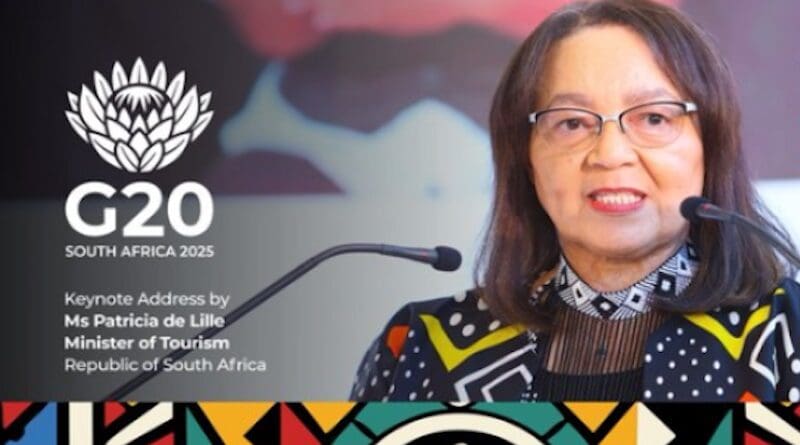South Africa’s upcoming role as host of the Second G20 Tourism Working Group (TWG) meeting in KwaZulu-Natal from May 11–13, 2025 marks a defining moment not just for the country but for the entire African tourism landscape. As the only African nation within the G20, South Africa is uniquely positioned to bridge the gap between global tourism policy and the realities on the continent, and this summit reinforces its position as a continental leader in tourism strategy, innovation, and sustainability.
With Minister Patricia de Lille expected to deliver the opening address, the event promises to set the tone for collaborative, future-forward discussions centered on inclusive and sustainable tourism. The summit’s agenda aligns with key G20 priorities, including people-centered AI, SME empowerment, tourism investment and financing, air connectivity, and resilience building—critical pillars for a post-pandemic, climate-conscious tourism economy.
But more than the agenda, it’s the symbolic and strategic significance of hosting the meeting in KwaZulu-Natal that matters most. This coastal province, rich in Zulu heritage, biodiversity, and scenic coastal tourism attractions, exemplifies the kind of experience today’s conscious traveler seeks: immersive, culturally rich, and environmentally responsible. By bringing the world’s top tourism policymakers to KwaZulu-Natal, South Africa is not only showcasing its product—it’s shaping the global narrative.
A Position of Influence
South Africa’s seat at the G20 table gives it a voice on matters that will define the next era of tourism growth. This includes ensuring Africa’s travel realities—such as fragmented air networks, lack of regional integration, and underdeveloped tourism financing systems—are reflected in global action plans.
As the chair of the TWG meeting, Director-General Nkhumeleni Victor Vele brings deep institutional knowledge and a clear vision to the discussions. His stewardship ensures that South Africa’s developmental priorities—especially community-based tourism, inclusion of marginalized groups, and rural development through tourism—are incorporated into the G20’s global tourism framework.
This is especially significant at a time when Africa continues to be underrepresented in global tourism decision-making despite being one of the most promising regions in terms of natural and cultural tourism assets. South Africa’s active participation helps to counterbalance this by highlighting successful African-led solutions and models worth replicating across the continent.
A Catalyst for African Tourism Professionals
The outcomes of this meeting will reverberate across the African tourism industry, offering insights and strategic direction for tour operators, travel agencies, and hospitality businesses. African tourism professionals must therefore pay close attention to the resolutions and frameworks discussed, especially those around tourism financing and air connectivity—two areas that could unlock massive potential across the continent.
For instance, discussions around supporting tourism SMMEs with innovation and AI tools are particularly relevant to Africa’s youthful, entrepreneurial population. With the right support and digital access, these young entrepreneurs could transform tourism storytelling, product development, and delivery models across Africa, reaching global markets more efficiently.
Moreover, air connectivity remains one of the biggest barriers to intra-African travel, often making it easier to fly to Europe than between neighboring African countries. South Africa’s leadership in advocating for improved and seamless regional air travel at a global level could pressure stakeholders to prioritize the Single African Air Transport Market (SAATM) and its integration into global networks.
Sustainable Leadership Through Action
South Africa is not only talking the talk but walking the path of sustainable tourism leadership. Its policies on responsible tourism, community involvement, and green transformation place it ahead of many countries on the continent. Hosting the G20 TWG meeting allows it to demonstrate these practices in action, offering a working blueprint for other African nations to emulate.
Additionally, the summit presents a platform to reignite global confidence in South Africa as a safe and enriching destination, a critical move after years of pandemic disruption and economic downturn. For travel agents, this provides fresh narratives to attract tourists eager for responsible, meaningful travel.
Looking Ahead
The G20 TWG meeting in KwaZulu-Natal is more than a diplomatic gathering; it’s a moment of continental pride and opportunity. As a proven destination with global influence and African roots, South Africa is spearheading the conversation on the future of tourism. The summit will strengthen its influence, offer guidance to its neighbors, and reinforce Africa’s voice in shaping the tourism of tomorrow.
For African tourism professionals, this is a chance to align strategies, network globally, and position Africa as a destination of the future—inclusive, sustainable, and powered by its people.


